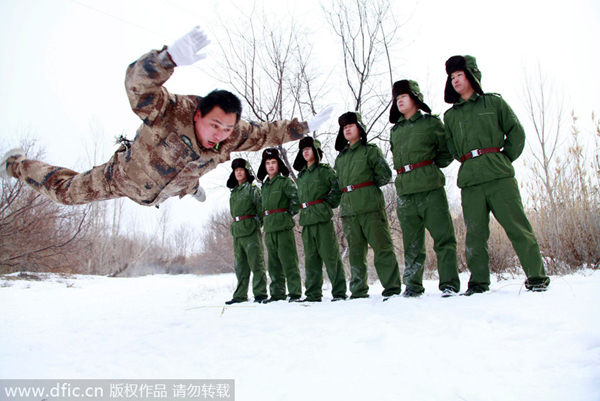Corps plays key role in fight against terror
(Xinhua) Updated: 2014-10-06 10:07
|
 Soldiers in the Xinjiang Production and Construction Corps practice training in this 2012 file photo. [Photo/IC] |
The Xinjiang Production and Construction Corps, a specialized paramilitary force, has played a special role in safeguarding the autonomous region's social stability and in cracking down on violent terrorism, a central government white paper said on Sunday.
"Xinjiang has a long border, and safeguarding it is a responsibility the State has entrusted to the XPCC," said the white paper on the history and development of the corps.
The white paper was issued by the State Council Information Office to mark the 60th anniversary of the corps' founding.
Since the 1980s, the threat to Xinjiang's social stability presented by the three forces of separatism, religious extremism and terrorism has grown, it said.
To confront the threats, divisions, regiments, companies, enterprises and public institutions under the XPCC have established emergency militia battalions - companies and platoons that enable it to respond rapidly to terrorist activities, the white paper said.
The XPCC has played crucial roles in fighting terrorism and maintaining stability, it said. Because they are familiar with local situations, XPCC militias were able to strike swiftly and join hands with armed police and various ethnic groups in cracking down on terrorists.
In rapid response to the July 5, 2009 Urumqi riot, the XPCC sent militias to patrol the city and guard key districts from possible attacks.
"At present, the XPCC is focusing its efforts on becoming a top militia force in China," the paper said, noting that it has been a consistent policy of the central government to support the growth of the XPCC.
At present, Xinjiang is at a critical stage in establishing lasting social and political stability, it said.
"It has been China's long-term strategy to give better play to the unique role of the XPCC in maintaining stability and safeguarding the border," it said. "Under new conditions, the XPCC should never be allowed to weaken; rather, it must be strengthened."
The white paper elaborated on the founding, development, responsibilities and structure of the XPCC and its roles in promoting economic development, safeguarding border areas, maintaining stability and promoting ethnic unity in the western region.
The XPCC has made "indelible contributions" to the development of Xinjiang by promoting unity among ethnic groups, maintaining social stability and strengthening national border defense, it said.
By the end of 2013, the XPCC had 176 regiments and 14 divisions, the white paper said.
- Govt encourages people to work 4.5 days a week
- Action to be taken as HIV cases among students rise
- Debate grows over reproductive rights
- Country's first bishop ordained in 3 years
- China builds Tibetan Buddhism academy in Chengdu
- Authorities require reporting of HIV infections at schools
- Typhoon Soudelor kills 14 in East China
- Police crack down on overseas gambling site
- Debate over death penalty for child traffickers goes on
- Beijing to tighten mail security for war anniversary







